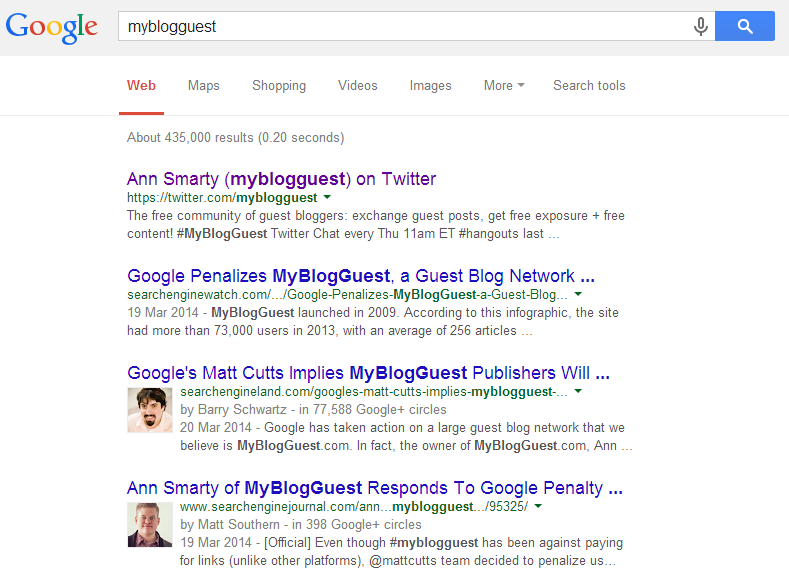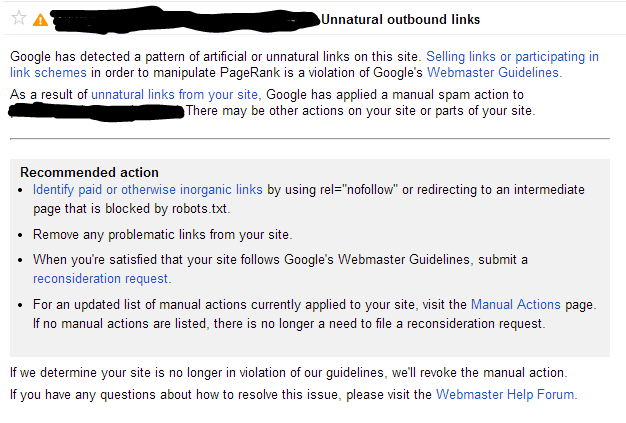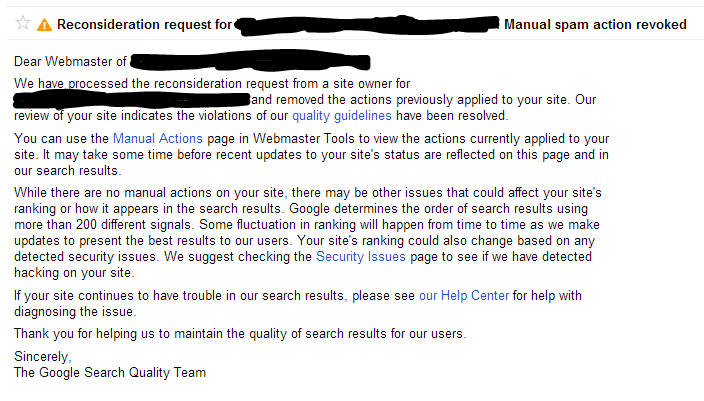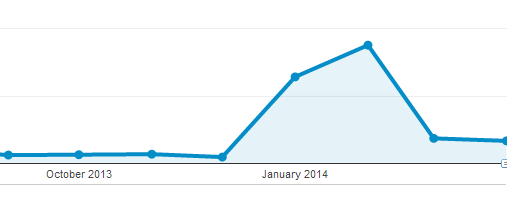Is getting a Google penalty really as bad as it sounds?

In this article Channel Digital’s resident SEO chick Amanda Brooks discusses Google manual penalties, websites blacklisted from Google's search results and negative SEO being a reality. How to deal with negative SEO and running one of her blogs directly into a manual Google penalty and getting it revoked in less than two weeks.
Recently Google have been clamping down on any activity that goes against their quality guidelines in regards to link building especially paid link building. There have been numerous sites that hold their business models solely on sharing guest posting opportunities whether paid or unpaid modules and all have been recently hit hard or are now frantically changing their sites to avoid the wrath of Google.
On the 19th of March Matt Cutts head of web spam at Google tweeted that Google had taken action on a large guest blog post network.
Today we took action on a large guest blog network. A reminder about the spam risks of guest blogging: http://t.co/rc9O82fjfn
— Matt Cutts (@mattcutts) March 19, 2014
This was looking more and more like the post was talking about the website http://myblogguest.com/ and as of today 30/04/2014 when searching for My Blog Guest within Google the site still doesn’t rank for its own name, a clear sign that Google do not want them within their index.

But there is a strong argument that MyBlogGuest didn’t violate Google guidelines on paid link building, but perhaps the fine line of large-scale article marketing is where they have fallen down. Bloggers and marketers do not exchange money for posts but they do this to gain SEO benefits and boost their visibility within search results which does violate Google’s guidelines.
The Guidelines can be perceived as quite vague, in one line they strongly advocate that any form of link building, paid or unpaid, free exchanges or mass guest posting violates their terms.
“Any behaviour that manipulates links to your site”
“Large-scale article marketing or guest posting campaigns with keyword-rich anchor text links”
“The best way to get other sites to create high-quality, relevant links to yours is to create unique, relevant content that can naturally gain popularity in the Internet community. Creating good content pays off: Links are usually editorial votes given by choice, and the more useful content you have, the greater the chances someone else will find that content valuable to their readers and link to it.”
The problem with these guidelines is that they are vague, claiming that ‘ANY BEHAVIOUR’ that manipulates links to your site can be seen as violating their terms, but how can Google tell the difference between natural and unnatural links? Previously black hat linking was quite obvious - you would see blog-rolls and sidebar links on every single page of a website all linking through a targeted anchor text. This was often confirmed with the site hosting the text links with ‘Add your text link’ ‘we sell text links’ and ‘boost your SEO’. Times have changed and blurred the lines between black hat and white hat SEO drastically.
Google’s guidelines suggest that the best way to gain links is through unique, relevant content that ‘Naturally’ gains popularity. But how do you gain popularity? You could post hundreds of amazing articles, videos, and images but unless you already have a following of visitors that will hopefully share your content how will people see your wonderful content? Guest posting is a great way of utilising other popular websites and their communities to gain attention to your brand and what you have to say. Once you have built your following, can you then leave the guest posting alone or even leave Google behind and build and rely on traffic from other sources?
Could Negative SEO become a reality?
Could Google’s new guidelines stop people from using Google? I don’t think that ‘Googling’ for an answer will end any time soon but I do think that times are changing. Google wants to clamp down on people linking between sites that are there purely to gain search results benefits, but will this have a knock-on effect? There’s already a lot of talk about the situation being so serious that it is becoming easier to use these dangerous techniques on your competitors websites to get them penalized and knocked off the top spot. Negative SEO has become a buzz word recently and at Channel Digital we have even noticed this attempt on one of our clients. Here at Channel we do regular checks on our clients’ backlinks to notice any unusual activity or any unwanted links and up until recently this wasn’t proving very fruitful. But when one client’s rankings and traffic started to slide and it was correlated to a massive gain in links it seemed a worthwhile exercise.
Previously it was all about the quantity of links, the more links the higher your site would rank and to be honest the quality of where those links were coming from wasn’t really relevant. You would look at your competitors and they were all playing the same game and applying the same tactics and these worked. But as the years passed and the guidelines changed and the Disavow file was born websites' backlinks would be ploughed through with a fine tooth comb and anything that was perceived even slightly on the border line were removed. Looking back at a client we have worked on at Channel highlighted a sudden increase of backlinks, from a few hundred backlinks suddenly the links were ploughing into the thousands and these weren’t quality links. These links were mostly from blog comments and weren’t any way related to any technical SEO activity that we had completed on the site. The blog comments were using targeted anchor texts and were strangely NoFollowed links. From previous experience and guidelines we would ignore NoFollowed links as these don’t count towards positive or negative SEO but knowing the website inside out and knowing there were no other issues the drop in rankings could only be related to these nasty growing links. With a disavow file created this was submitted and in just a few weeks the rankings started to recover and return to their previous position. Now weekly audits are completed adding to the disavow file as new links are appearing daily.
There is becoming a fear of linking not just building links to your site but also from your site, with the lines between editorially given links and paid links or even guest posts blurring, are people reluctant to link to you even if they want to for the fear of getting wrongfully caught up with a Google penalty? Are we heading to an internet built without links, just mentioning the brands you are talking about or linking only using NoFollowed links and the dofollowed link becoming another internet thing of the past?
All your eggs in one basket
It has become common place to put all your eggs in one big Google coloured basket and rely solely on them as your main traffic source. With Bing and Yahoo not nearly popular enough to drive enough organic traffic to your site this creates a very risky business model; with your position on Google like a game of Russian roulette - a real possibility they will remove you at any moment. This has recently been seen with many businesses like Rap Genius getting completely removed from Google’s index on Christmas day last year, through a link building idea through Twitter that they thought would go unnoticed.
With Google’s suggestions to solely rely on ‘great’ content gaining natural links to your site I think it’s time to look to other sources for your traffic depending on your business. Utilise social media sources like Facebook, LinkedIn, Twitter, Pinterest and even Google+ to build your audience and build on those that see that wonderful content that you have created and hopefully sharing it naturally and gaining those all-important links that Google wants. This way if one source does go a little off piste, you’ll have built audiences on many other platforms to continue sending you traffic through any rocky times. Although this is easier said than done, and for small businesses with limited budgets creating a presence on multiple social media platforms could be a daunting task with the results simply available through Google and a few guest posts quite alluring.
Guest blog post testing
Before I continue any further I want to point out this experiment is in no way related to the work completed at Channel Digital but a private test away from our clients. The test was using guest blogging platform PostJoint. At the start of the year I started publishing paid blog posts on my private blog using post joint, aside from making a few pretty pennies the traffic was steadily increasing with the blog posts I published. The businesses would then share my blog posts about them gaining additional coverage that I wouldn’t have achieved on my own. With the money and the traffic rolling in it felt too good to be true but I knew I was on a tight rope with falling off and getting my blog burned a real possibility at any moment. Sure enough like Rap Genius getting punished on Christmas day my fail to Google was seen on Good Friday waking up to receive a manual penalty for unnatural links from my blog.

At first I thought this seemed a little unfair as my blog wasn’t mainstream with only a page rank of two and receiving around 10,000 page views a month with over 200 naturally written blog posts by myself and only a smattering of under 20 guest blog posts some with followed links others with NoFollowed links. All were tagged with a ‘guest post’ tag as I wanted to be honest with what I was doing and not mislead any real readers, as although I would only post articles related to my blog some of the links weren’t my usual type of local Cornish business I usually link to.
After a little research I found that on the same day of my manual link penalty from Google the site I was using amongst others for my guest posts was penalised by Google.
On the 18th April Post Joint was ousted by Google for link building practises and I believed that through the platform my blog was penalised. I instantly checked my traffic and it didn’t seem effected, I checked a few rankings and again these all seemed to be stable. I wondered if I had received a manual penalty, other than losing my page rank, what was the point of this penalty? My traffic and visibility seems to be unaffected and the visits to the blog now compared to before the guest posting commenced is still considerably higher. After less than two weeks since the manual penalty a reconsideration request was submitted, it was accepted almost immediately and confirmation from Google that the manual action has been revoked.

This leaves me quite confused, was the site automatically sent the warning because my blog was listed on Post Joint? Was this a scare tactic to say you’ve been found not playing by the book so we are sending you a warning to stop but not actually affecting your traffic? I get a lot of my traffic through social media and social bookmarking sites so do I really need to worry about a penalty from Google? As previously said the only thing to have changed is losing my page rank, and this is a well-known metric only used by marketers to know whether a site is worth working with due to perceived benefits to SEO through a site with a higher page rank. This has taught me that it was a great little earner whilst I had the page rank to lure in paid posts but now I have lost the page rank I will no longer gain paid posts. Which is what Google wants? However like I said previously my traffic is still higher now than it was before the guest posting began in January.

Organic traffic only through Google Analytics.
The blog is still successful and as it is still making money through adsense which is what Google wants, Google still controls the landscape that we work in. Whether you're for or against Google it is worth remembering that it is their search engine and their index and if you want to appear in their results you play by their rules!
I’d be interesting in hearing your comments. Have you been effected by negative SEO? Did you use Post Joint or MyBlogGuest for guest posting and get a manual webmaster tools warning?

